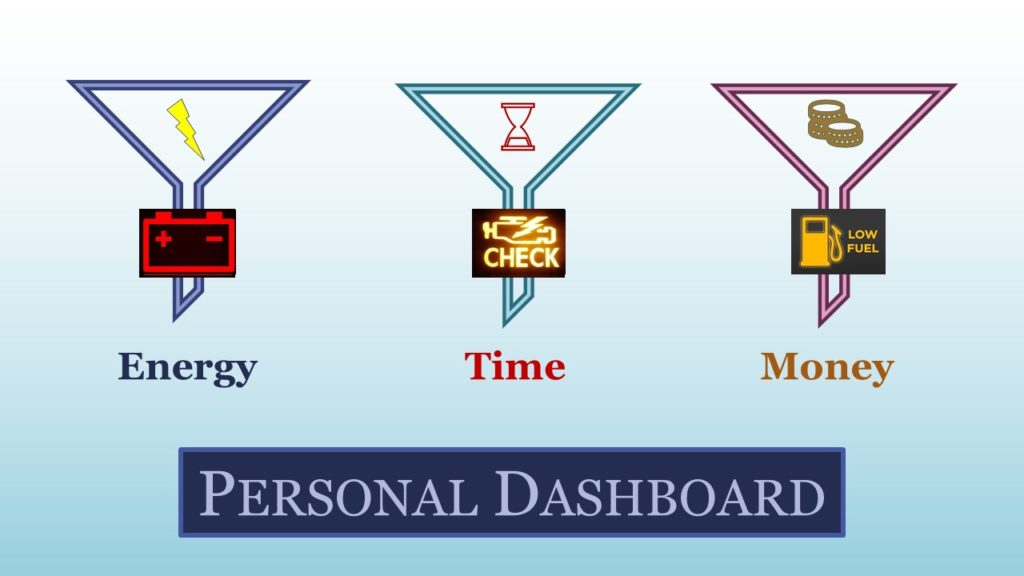Business and Leadership
Watch the Warning Lights
Dashboards are a phenomenon of the modern era. While they are primarily associated with a vehicle or operational equipment, the basic concept of compiling critical data and displaying it in an easy-to-read format has become much more widespread. Businesses use dashboards for measuring and managing all sorts of important data such as financials, marketing and sales performance, production timetables, and safety.
Have you ever wished for a “dashboard” to quickly give you a sense of how well you are doing as a person? Or in relation to the essentials that affect, not only the quality of your life, but your ability to serve the people and institutions you’ve committed to? After my own burnout, I realized in retrospect that my “personal dashboard” had had warning lights flashing. Had I been aware of them earlier, I might have been able to avoid the crash that took me out of leadership for a significant period. (You can read some of my reflections on that experience here.)

What kind of dashboard should leaders have, and on what sort of resources should it be reporting? The most obvious one is likely a financial dashboard. Money is relatively easy to measure, though not always easy to manage—and while money alone has never made anyone happy, it is one of the significant tools of our lives. There is no question that a shortage of it can be a source of incredible stress.
While I’m certainly no expert on this matter, over the years I developed a level of proficiency that allowed me to see how I was doing, whether in personal, business, or church finances. This mainly involved simple data points that provided clear information, as opposed to the more unreliable “gut sense” of what was happening. Many resources are available for learning how to manage this critical resource and all that it represents. Don’t neglect or overlook it.
The second most obvious dashboard concerns an even more limited resource: time. Time comes to us in very measured quantity, and it comes consistently. We know exactly at what rate it comes to us; the unknown factor is how much of it we will have over the course of your lifetime. People manage the 24 hours a day, 7 days a week, and 365 days per year in the ways we choose.
During the more complex season of my life, I was trying to serve in senior church leadership and also as the president of a growing company. Time management was an extremely critical part of learning to manage my responsibilities and decide how much time I had to devote to each. In addition, there were the responsibilities of marriage, family, and other commitments that needed a slice of my time. I devoured books on time management and also worked with numerous mentors and coaches to maximize the time I had each day. Again, there are many resources available to assist in this critical area of stewardship.
The third resource that needs to be on the dashboard was one that I largely overlooked. I think I gave it some cursory attention, perhaps intuitively, when I became aware I was running low or getting more than the “normal tired.” That resource – just as critical as time, just as essential to life as money, is energy. Energy is also a limited resource; no one has an infinite supply. The bankruptcy of a person’s energy has serious repercussions for his effectiveness in leadership and broad, cascading implications for his social connections. Energy has four general categories: physical, emotional, mental, and spiritual. As complex creatures, we are not always aware which of these is most significantly contributing to a general feeling of losing energy, or of what it takes to replenish our sense of energy. This is a topic for future discussion.
Probably the most critical component of becoming aware of our energy levels and what actually contributes to their decline or recharge is healthy self-awareness. People vary a great deal in how well they truly know themselves. Much of what we know about ourselves comes from comments made by people around us over the course of a lifetime – parents, teachers, pastors, and friends are all a significant part of the development of our self-knowledge.
I will reiterate, however, that a healthy self-awareness is essential to healthy leadership. This self-awareness must inform our stewardship of this most vital of resources. At any given moment, it is helpful to have a sense of our energy levels in all four of these subcategories while realizing that each facet is interwoven with and affects each of the others. For example, physical illness or weakness can impact our emotional and mental health. Our spiritual health can impact each of these as well.
Personally, I have not naturally been in tune with my emotions. Of course, I always saw that as a strength. (This points to a natural tendency to see ourselves as the epicenter of normality--the way we experience the world, see the world, and manage life is surely normal!) It takes a larger reference point and broader experience to recognize how each of us relates to and is a particular version of the larger human population. Personality profiling tools can help to give us language for this--but more on that later.
This year, commit to paying attention to this critical dashboard. You will not become an expert overnight, but it is a journey that is worth starting. Recognize the dashboards as individually significant and collectively critical. Identify the warning signs and act; take committed, thoughtful action to address any warning lights that are flashing. When one or two lights are flashing, you can draw from the resources of the healthy parts to address the areas where you are struggling. When all three lights are flashing, it’s time for immediate action: tell someone. Find a counselor and doctor. Reach out to a true friend. It’s not worth continuing the insanity. Burnout is not a virtue.